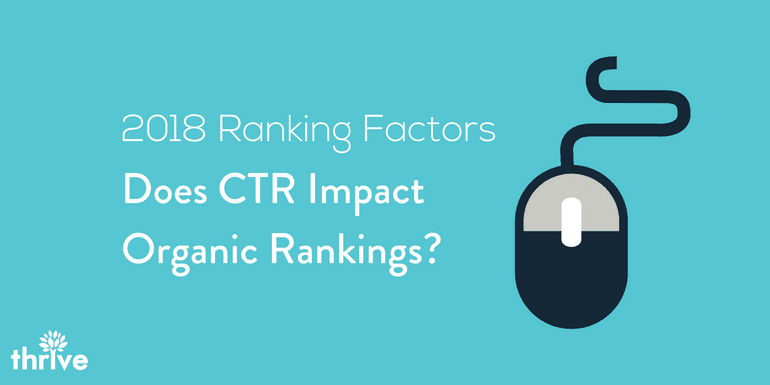There has always been this SEO rumor for a few years now that that click-through rate (CTR) affects your site rankings.
While Google denies that CTR affects rankings, Bing has confirmed this quite some time ago. However, according to Backlinko’s list of Google Ranking Factors for 2018, click-through-rate does have an impact on rankings.
What are the Known Search Ranking Factors?
The top two ranking influences on organic rankings are links and content. Following those two is RankBrain, Google’s machine learning algorithm used to process and understand search queries.
We pulled together a list of “pseudo” case studies over the past few years to help us better understand how CTR has an impact on search rankings.
The Rand Fishkin Experiment
Rand Fishkin ran a test through his network of colleagues to see if click-through data would provide any bias in ranking a website higher. He found that there was a bias and he noted that there was even a geographic bias. Rand mentioned that he saw the biggest ranking improvement within the U.S. search results vs other international Google results. He believes that the majority of participants were based in the U.S., which lead to a stronger influence on the U.S. Google results.
User Behavior and Local Search
Recently Darren Shaw presented, “User Behavior and Local Search” at the Dallas State of Search conference. Darren looked at whether clicks affect rankings in regards to local search queries. He did find that some of the queries that he tested did have some impact on improved rankings, but he also noted that in some cases there was no impact at all.
His assumption was that Google had significant data on certain keywords and that there was less deliberate shifting (by Google) of the search results during his testing. Darren references an article that speaks to multi-arm bandits and the epsilon-greedy method that may be occurring for those search terms.
Negative SEO Without Backlinks
A recent blog post, Negative SEO with No Backlinks? A Case Study, from Bartosz Góralewicz, took a look at how several of his clients were having their rankings secretly sabotage by click bots. Bartosz found that the sites were suffering a click-through attack via Google search results. He notes that a CTR bot was used to find the client’s keywords that they ranked for in Google and then click on the competitor’s listings.
This influenced his competitor’s sites to increase in rankings, while his client’s sites lost rankings. This could have been due to the fact the client’s site was now below the established CTR threshold and deemed a low-quality site by Google.
Can CTR Bots Really Affect Rankings In Google?
Now is this totally plausible? Well, Google does have access to the click-through rate from their search results to your website and could use this in the Google ranking algorithm. Google already has a patent (#8,005,716) that shows a method on how to determine if the CTR is being manipulated.
So, Google can establish CTR thresholds to understand if they are too high (manipulation) or too low (low-quality site). Google can also determine the geolocation of the clicks as well as determining if the clicks are clustered from a particular location.
Can a CTR bot outsmart Google? Simply yes. Is it easy? Simply no.
The more interesting and potentially dangerous trend is that there can be the potential for a linkless negative SEO campaign as mentioned in Bartosz’s article. A linkless negative SEO campaign from CTR bots could sneak up and blindside a business, especially where a business is not working with a highly qualified SEO company who understands SEO let alone understands this type of threat.

